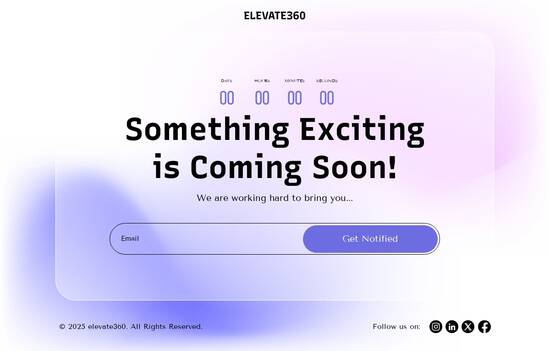
HTML page templates with pricing tables
Explore Similar TemplatesAbout template
Manage your templates with pricing tables and improve your conversion rates. Easily facilitate trust and transparency with your customers right now.
Recommended templates

Easy to build without coding
With the intuitive drag-and-drop builder, anyone on your team can create high-converting pages without any knowledge of code or design. Make enhancements to your landing page with custom widgets using Javascript, HTML/CSS, or third-party scripts.

Multiple layouts for any industry and goal
Select from 500+ landing page layouts built to boost conversions across industry-specific scenarios. Customize them by adjusting fonts, adding images, and generating on-brand content with the AI assistant. Quickly scale with Instablocks® and Global Blocks that you can save, reuse, and update globally.

Loads fast and looks polished on any device
Every template is responsive, which means they present professionally on any device and load blazingly fast with our Thor Render Engine. You can also power them up with Google AMP technology to deliver an unparalleled mobile experience and drive higher conversions.

Robust analytics & experimentation
Get real-time updates and reporting across all your devices, showing the number of visitors, conversions, cost-per-visitor, and cost-per-lead. Launch AI-powered experiments, run A/B tests, and use heatmaps to analyze user behavior, then optimize your landing page to maximize conversions.







Easy to build without coding
With the intuitive drag-and-drop builder, anyone on your team can create high-converting pages without any knowledge of code or design. Make enhancements to your landing page with custom widgets using Javascript, HTML/CSS, or third-party scripts.
Multiple layouts for any industry and goal
Select from 500+ landing page layouts built to boost conversions across industry-specific scenarios. Customize them by adjusting fonts, adding images, and generating on-brand content with the AI assistant. Quickly scale with Instablocks® and Global Blocks that you can save, reuse, and update globally.
Loads fast and looks polished on any device
Every template is responsive, which means they present professionally on any device and load blazingly fast with our Thor Render Engine.
Robust analytics & experimentation
Get real-time updates and reporting across all your devices, showing the number of visitors, conversions, cost-per-visitor, and cost-per-lead. Launch AI-powered experiments, run A/B tests, and use heatmaps to analyze user behavior, then optimize your landing page to maximize conversions.
All the features you need to build html pricing table template
Explore more featuresLearn how to build pricing page template html
Frequently asked questions about pricing table template html css
Leading the way in building high-performing landing pages





Create effective HTML page templates with pricing tables using Instapage
Transform your marketing strategy with Instapage's powerful landing page and conversion rate optimization (CRO) platform. HTML page templates enhance user experience and ensure you capture leads effectively, maximizing the ROI on your digital campaigns. In this guide, you will learn how to effectively utilize Instapage's capabilities to create stunning HTML page templates complete with pricing tables tailored to your business needs.
Understanding the importance of HTML page templates
HTML page templates with pricing tables are essential tools for businesses seeking to streamline their customer acquisition process. Here’s why they are beneficial:
- High conversion rates: Well-designed templates can significantly boost your conversion rates by providing clear and concise information that encourages user engagement.
- User-centered design: Templates are created with the end user in mind, ensuring that the information is easily digestible and attractive, meeting the diverse needs of your target audience.
- Time-saving: Utilizing ready-made templates allows for faster deployment of marketing campaigns, enabling you to focus on strategic initiatives rather than design.
Step 1: Choose the right template for your needs
Instapage offers over 100 customizable templates designed for various industries. Select a template that resonates with your brand's voice:
- Industry-specific designs: Look for templates tailored to your vertical—be it tech, education, or financial services—to ensure relevance.
- Responsive layout: Ensure that the template is mobile-friendly, catering to users across devices.
- Customization options: Select templates that allow for extensive customization to align with your branding.
Step 2: Customize your pricing table
Once you have your template, it's time to configure the pricing table. Here are key features to consider:
- Comparison features: Include side-by-side comparisons that accurately reflect the offerings of your services.
- Clear pricing tiers: Make sure your pricing tiers are displayed prominently to facilitate easy customer decision-making.
- Call to action: Embed strong CTAs within the pricing tables to drive conversions directly from your templates.
Step 3: Optimize your landing page
To ensure high performance of your HTML page templates, optimization is crucial.
- A/B testing: Utilize Instapage's built-in A/B testing capabilities to determine which design and pricing configurations work best.
- Analytics tracking: Use the analytics dashboard to monitor user behavior, making data-driven adjustments to improve user experience.
- Personalization: Implement dynamic text replacement to enhance engagement by tailoring the content based on visitor data.
In conclusion, modifying and optimizing HTML page templates with pricing tables significantly enhances user engagement and conversion rates. By following these steps, you can streamline your digital marketing efforts.
Ready to start creating high-converting HTML page templates with pricing tables using Instapage? Sign up today and take advantage of our extensive library of customizable templates!
People also ask about HTML page template with pricing tables
Unpacking the Essentials: Understanding HTML Page Templates with Pricing Tables
The significance of pricing tables in HTML page templates
Pricing tables serve as vital components in HTML page templates, particularly for businesses aiming to showcase their services or products effectively. Understanding how they function is essential for optimizing digital marketing efforts. Essentially, pricing tables simplify the decision-making process for potential customers by presenting clear and concise comparisons of product offerings.
An effective pricing table consists of several key components: columns for features, prices, and value propositions, alongside call-to-action buttons. By incorporating visually appealing designs and straightforward layouts, these tables can enhance user experience significantly.
Clear pricing structures help in building customer trust.
Visual comparison aids quick decision-making.
Highlighting features encourages upselling.
Role of HTML in pricing table design
HTML plays an integral role in the design of pricing tables. A solid HTML structure ensures that pricing tables are accessible to all users, including those relying on assistive technologies. Additionally, a well-organized HTML framework allows for easier customization, enabling marketers to align the tables with specific branding needs and ensuring consistency across web platforms.
Using template-based designs not only contributes to a uniform user experience but also accelerates page development. Templates help maintain visual consistency across various pages, which reinforces brand identity and aids in building trust with users.
Integration of pricing tables into landing pages
Integrating pricing tables into landing pages significantly enhances their effectiveness by presenting users with comparative choices in an easily digestible format. A well-structured pricing table creates a direct pathway for users to make informed purchasing decisions, fostering a positive user journey.
Many successful online businesses utilize this strategy. For instance, SaaS companies often highlight features of their service tiers using pricing tables, which allows potential customers to see the added value of premium options at a glance.
Exploring diverse pricing table website templates
There are numerous types of pricing tables that cater to different business models. From basic formats that display services side by side to tiered systems that showcase multiple levels of features, it's crucial to select a format that aligns with your business strategy. For example, SaaS companies frequently use tiered pricing models, while businesses in the real estate sector might lean toward customized tables that highlight property features.
Basic Pricing Tables: Ideal for straightforward service offerings.
Tiered Pricing Tables: Useful for service packages with multiple features.
Custom Pricing Tables: Best for industries like real estate that require detailed comparisons.
Features of high-performance pricing website templates
When selecting a pricing table template, several features are essential for enhancing user experience. Mobile responsiveness is crucial, as more customers browse on smartphones and tablets. A pricing table must maintain usability across all devices to maximize reach and user engagement.
In addition to mobile responsiveness, user-friendly design elements such as clear buttons, impactful icons, and clean layouts can significantly improve conversion rates. Providing direct links for purchasing or inquiries through clear call-to-action buttons makes it easier for potential customers to engage with the price offerings.
Customization potential of pricing page design
Customizing pricing tables using CSS can enhance overall brand identity. Businesses can adjust colors, fonts, and images to ensure that their tables not only serve their purpose but also align with their overall branding guidelines. Personalization can significantly improve customer connection and recognition.
Responsive templates allow for easy customization options, enabling marketers to tweak specific elements without requiring extensive coding knowledge. This versatility ensures that the pricing tables remain fresh and relevant, dynamically adapting to market changes or promotional campaigns.
Effective web design: Creating a compelling pricing page
Designing an ideal pricing page begins with understanding its essential elements. Key features include headers that clearly label options, concise descriptions explaining the benefits of each price tier, and strategic placement of CTA buttons to encourage immediate action. Establishing a clear visual hierarchy helps guide users to important information quickly.
Effective use of white space can make pricing tables more digestible, allowing users to absorb information without feeling overwhelmed. It’s essential to maintain a balance by utilizing images and graphics that complement the information displayed without overshadowing the core message.
Best practices for pricing table layout
When designing pricing tables, layout orientation is crucial. Traditional side-by-side comparisons work for some brands, but a stacked or column format might be more effective for others. Incorporating comparison features allows users to see the strengths and limitations of different options at a glance.
Utilizing imagery and graphics effectively can play a significant role in enhancing comprehension. High-quality images paired with concise text can visually lead users to understand the advantages that come with each price point.
A/B testing pricing pages for enhanced performance
In the pursuit of optimization, A/B testing pricing pages can yield valuable insights. Data-driven approaches allow marketers to evaluate different layouts and content strategies based on real-world user interaction. Tools like heatmaps and user session recordings provide granular insight into how visitors interact with your pricing tables.
Keeping track of metrics such as conversion rates, bounce rates, and time spent on the page can inform necessary adjustments, leading to continual improvement. A/B testing ensures that pricing strategies remain effective and aligned with user preferences.
Niche applications of pricing tables: Real estate pricing page template
Real estate pricing pages present unique challenges. Unlike typical service offerings, these pages often need to index various property features in an intuitive manner. Successful implementation of pricing tables in real estate requires showcasing not only price points but also property attributes like location, size, and amenities.
Case studies show that real estate websites that incorporate comprehensive pricing tables see higher engagement and conversions from potential buyers. Providing a downloadable brochure or a quick inquiry form near the pricing options can further engage interested buyers.
Tailoring templates for real estate audiences
Engaging real estate audiences requires strategic layout design customized to focus on buyer interests. The use of high-quality visuals and even interactive elements, such as virtual tours, can capture potential buyers' attention effectively. Pricing pages should not only convey costs but also create a storyline that resonates with buyers’ emotional investment.
Using well-structured templates ensures that these elements are effectively presented. Incorporating filters for price ranges can streamline the user experience, allowing buyers to find relevant listings quickly.
Integrating lead generation strategies into pricing pages
Incorporating lead generation strategies into pricing pages is essential for optimization. Pricing tables can be enhanced with inquiry forms, allowing users to easily reach out for more information. Positioning these forms near prominent pricing information can facilitate seamless user interaction.
Additionally, leveraging lead magnets alongside pricing tables, such as free consultations or downloadable guides, can capture potential leads. Targeted offerings meet users' needs while simultaneously encouraging conversions.
Harnessing business website templates for pricing strategies
Choosing the right business website template is critical for effective pricing strategies. Templates should reflect the characteristics of your business model, whether B2B or B2C. Ensuring that the selected templates align with your brand's values and overall marketing strategy is essential in maintaining credibility.
Several reputable sources provide premium templates designed for diverse business needs. Investing in high-quality templates not only ensures a professional appearance but also enhances user engagement, which can drive higher conversion rates.
Integrating pricing tables into business models
Integrating pricing tables effectively means tailoring templates to suit different business strategies. B2B models may focus on long-term contracts with detailed pricing structures, while B2C businesses might prioritize clarity and quick sales. Clear pricing and value propositions foster trust among users, essential for converting leads into customers.
Transforming templates into dynamic sales tools
Creating interactive pricing tables enhances user engagement. Techniques such as embedded features enable users to explore additional options or view more information about certain pricing tiers without leaving the page. Regularly updating content ensures your pricing tables remain relevant, addressing both customer queries and market changes effectively.
The importance of PSD templates in pricing page design
Understanding PSD templates and their role in web design can significantly impact the effectiveness of pricing pages. PSD templates provide a blueprint for professional design and offer flexibility during development. While they allow for high customization, comparing them with more straightforward web templates reveals some strengths and weaknesses.
Steps to convert PSD templates into functional pricing tables
Converting static PSD designs into functional pricing tables involves specific considerations. Developers must ensure that the design translates effectively across web formats while maintaining core functionalities. Utilizing the right tools and software enables seamless integration, enhancing user experience significantly.
Case studies of successful PSD template utilizations
Several innovative projects have successfully leveraged PSD templates to create compelling pricing pages. By studying these cases, marketers can identify effective design practices and inspiring approaches that improve user experience and drive conversions. Lessons learned from top-performing pricing tables highlight the importance of user-centric design.
The future of pricing tables in web development
Emerging trends in pricing page design indicate that user interface and user experience innovations will continue to evolve. As consumers become more accustomed to advanced web features, there will be an increasing demand for interactive and engaging pricing tables that go beyond mere price comparisons.
The role of AI and automation in pricing table creation
AI tools are beginning to play a significant role in automating dynamic pricing adjustments, allowing businesses to adapt quickly to market trends. Incorporating AI also enhances customization, providing personalized user experiences based on historical data and behavior.
Preparing for future changes in pricing strategies
Anticipating shifts in consumer behavior and preferences is paramount for businesses. Developing strategies that focus on transparency and clear communication of pricing can help brands stay ahead of competition while effectively addressing consumer concerns.
Ready to skyrocket conversions?
Supercharge your ad campaigns with high-performing landing pages
Get started














